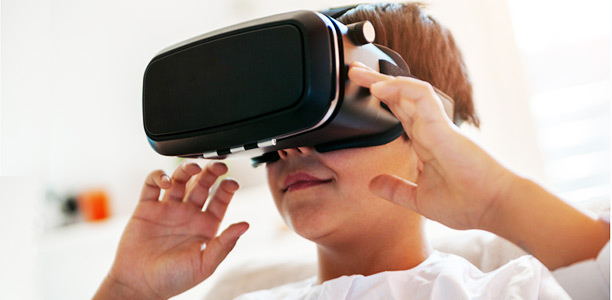Monash University and Monash Children’s Hospital researchers are conducting the world’s largest study of virtual reality headsets to improve the experience of children undergoing needle procedures.
Needle procedures, including intravenous cannulas and blood tests, can be extremely distressing for many children and can lead to life-long anxiety.
For the first time, a collaborative research team led by Monash University Research Fellow Dr Evelyn Chan, is investigating the use of virtual reality (VR) headsets to reduce fear, pain and anxiety associated with these procedures.
Dr Chan said current pain management techniques such as local anaesthetic cream or distraction were inadequate for some children, and may result in the need for restraints and/or sedation.
“The VR headsets distract children, allowing them to experience and interact with animated sea-life, including fish, dolphins and whales, while medical staff take blood or insert an intravenous cannula,” Dr Chan said.
The VR animations have been created to perfectly coincide with the procedures being carried out.
“Children ‘feel’ the water while a nurse or doctor prepares and cleans their hand, and fish gently bite at their hand while a needle is inserted,” Dr Chan said.
Principal Investigator at Monash Children’s Hospital, Dr Erin Mills, said VR allowed children to be transported into an engaging and interactive 3D ‘virtual world’ which provided an escape from the real world where the procedure was being performed.
“The virtual reality experience has been designed to be immersive, enjoyable and help relax and reassure the child while medical procedures are taking place,” Dr Mills said.
Dr Chan said their vision was for every child to have access to high quality needle pain management, anytime, anywhere – whether they were in a world-class kid’s hospital, a busy pathology clinic, or a remote GP practice.”
“VR has huge potential to transform patient experiences. One day VR might become a cornerstone of patient care – helping support patients in every step of their health journey, from being able to walk through the operating room before their surgery, to supporting them through their hospital stay, and helping them during recovery with rehab and preventive health activities,” Dr Chan said.
Two-hundred-and-forty patients from the Pathology and the Emergency Departments at Monash Children’s Hospital are currently being recruited to the study. The Royal Children’s Hospital will open an arm of the study next month.
More than 30,000 patients presented to Monash Children’s Hospital Emergency Department in the last 12 months, with 4,500 requiring blood tests.
(Source: Monash University)










